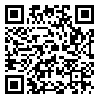Volume 19, Issue 131 (2022)
FSCT 2022, 19(131): 17-29 |
Back to browse issues page
Download citation:
BibTeX | RIS | EndNote | Medlars | ProCite | Reference Manager | RefWorks
Send citation to:



BibTeX | RIS | EndNote | Medlars | ProCite | Reference Manager | RefWorks
Send citation to:
sadr B, Alizadeh A, Tabibiazar M, Hamishehkar H, Roufegarinejad L. Evaluation of the stability of VitD3 loaded zein hydrolysate nanocapsules in orange juice by ultrasound and its effect on the properties of orange juice. FSCT 2022; 19 (131) :17-29
URL: http://fsct.modares.ac.ir/article-7-56792-en.html
URL: http://fsct.modares.ac.ir/article-7-56792-en.html
1- PhD Student, Department of Food Science and Technology, Tabriz branch, Islamic Azad University, Tabriz, Iran.
2- Associate Professor, Department of Food Science and Technology, Tabriz branch, Islamic Azad University, Tabriz, Iran. ,ainaz_alizadeh@hotmail.com
3- Associate Professor, Department of Food Science and Technology, Faculty of nutrition and food sciences, Tabriz University of Medical Sciences, Tabriz, Iran.
4- Professor, Drug Applied Research Center, Tabriz University of Medical Sciences, Tabriz, Iran.
5- Associate Professor, Department of Food Science and Technology, Tabriz branch, Islamic Azad University, Tabriz, Iran.
2- Associate Professor, Department of Food Science and Technology, Tabriz branch, Islamic Azad University, Tabriz, Iran. ,
3- Associate Professor, Department of Food Science and Technology, Faculty of nutrition and food sciences, Tabriz University of Medical Sciences, Tabriz, Iran.
4- Professor, Drug Applied Research Center, Tabriz University of Medical Sciences, Tabriz, Iran.
5- Associate Professor, Department of Food Science and Technology, Tabriz branch, Islamic Azad University, Tabriz, Iran.
Abstract: (2020 Views)
Vitamin D3 is a fat-soluble vitamin and one of the most important vitamins for body. Enriching foods, especially juices, with this vitamin requires encapsulation due to dispersion problems and sensitivity to oxidation and light. Therefore, in the present study, the effect of using zein hydrolysate and the effect of ultrasonic frequency (40 kHz) on the structure of nanocomplex carrying vitamin D3 and its stability in orange juice were investigated. The encapsulation and loading efficiency as well as the size of the prepared nanoparticles were measured and physicochemical, microbial and sensory evaluations were performed on the juice during days 1, 15 and 30. Encapsulation and loading efficiency for nanoparticles containing vitamin D3 by ultrasonic pretreatment increased by about 12.2 (70 vs. 62.4) and 14.73% (10.69 vs. 9.32), respectively. Particle size and zeta potential for different treatments were respectively obtained in the range of 49.59–58.49 nm and -24.5 – -36.62 and the use of nanocomplexes reduced the particle size and zeta potential compared to free vitamin D3 in orange juice. Regarding the physicochemical, microbial and sensory results obtained for fortified orange juice, zein hydrolysate nanocomplex has the potential to be used as a suitable and valuable carrier for enriching fruit juices with bioactive substances, especially vitamin D3, without any harmful effects.
Article Type: Original Research |
Subject:
Hydrocolloids, emulsion
Received: 2021/10/31 | Accepted: 2022/11/13 | Published: 2022/12/31
Received: 2021/10/31 | Accepted: 2022/11/13 | Published: 2022/12/31
Send email to the article author
| Rights and permissions | |
 |
This work is licensed under a Creative Commons Attribution-NonCommercial 4.0 International License. |









